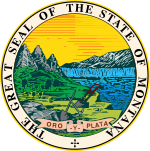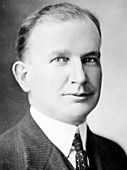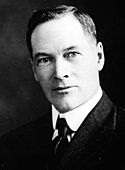
The 1978 United States Senate elections were held on November 7, in the middle of Democratic President Jimmy Carter's term. The 33 seats of Class 2 were contested in regular elections. Special elections were also held to fill vacancies. Thirteen seats changed hands between parties, resulting in a net gain of three seats for the Republicans. Democrats nevertheless retained a 58–41 majority.

The 1976 United States Senate elections was an election for the United States Senate. Held on November 2, the 33 seats of Class 1 were contested in regular elections. They coincided with Democrat Jimmy Carter's presidential election and the United States Bicentennial celebration. Although almost half of the seats decided in this election changed parties, Carter's narrow victory did not provide coattails for the Democratic Party.

The 1972 United States Senate elections were held on November 7, with the 33 seats of Class 2 contested in regular elections. They coincided with the landslide re-election of Republican President Richard Nixon. Despite Nixon's landslide victory, Democrats increased their majority by two seats. The Democrats picked up open seats in Kentucky and South Dakota, and defeated four incumbent senators: Gordon Allott of Colorado, J. Caleb Boggs of Delaware, Jack Miller of Iowa, and Margaret Chase Smith of Maine. The Republicans picked up open seats in New Mexico, North Carolina, and Oklahoma, and defeated one incumbent, William B. Spong Jr. of Virginia.

The 1964 United States Senate elections were held on November 3. The 33 seats of Class 1 were contested in regular elections. Special elections were also held to fill vacancies. They coincided with the election of President Lyndon B. Johnson by an overwhelming majority, to a full term. His Democratic Party picked up a net two seats from the Republicans. As of 2022, this was the last time either party has had a two-thirds majority in the Senate, which would have hypothetically allowed the Senate Democrats to override a veto, propose constitutional amendments, or convict and expel certain officials without any votes from Senate Republicans. In practice, however, internal divisions effectively prevented the Democrats from doing so. The Senate election coincided with Democratic gains in the House in the same year.

Carlos Wood Riddick was an American politician and businessman. He served as a Republican member of the U.S. House of Representatives from Montana's 2nd congressional district.

Scott Leavitt was a U.S. Representative from Montana. He served as chairman of the House Committee on Indian Affairs.

The 1976 United States Senate election in Montana took place on November 2, 1976. Rather than seek a fifth term, incumbent United States Senator Mike Mansfield, a Democrat, opted to retire, creating an open seat. United States Congressman John Melcher, who had represented Montana's 2nd congressional district from 1969 to 1977, won the Democratic nomination and defeated Stanley C. Burger, the Republican nominee, by a wide margin in the general election.

The 1934 United States Senate special election in Montana took place on November 6, 1934. Incumbent United States Senator John E. Erickson, who, as governor, had appointed himself to the seat in 1933 upon the death of Thomas J. Walsh, ran for re-election. However, he was defeated in the Democratic primary by James E. Murray, who was the former Silver Bow County Attorney and the Chairman of the State Advisory Board of the Public Works Administration. In the general election, Murray defeated Scott Leavitt, a former United States Congressman who had represented Montana's 2nd congressional district, and an independent candidate in a landslide to win his first term in the Senate.
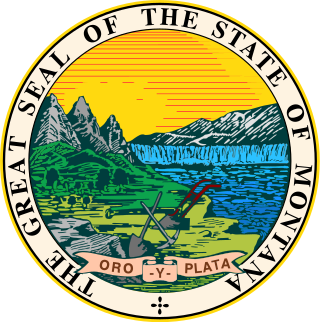
The 1930 United States Senate election in Montana took place on November 3, 1936. Incumbent United States Senator James E. Murray, who was first elected to the Senate in a special election in 1934, ran for re-election. He narrowly emerged from a competitive and close Democratic primary, wherein he was challenged by United States Congressman Joseph P. Monaghan, who represented Montana's 1st congressional district. In the general election, Murray was opposed by Thomas O. Larson, a State Senator and the Republican nominee, and Monaghan, who, after losing the primary, ran as an independent candidate. Murray ended up winning a second term, and his first full term, in a landslide, defeating both of his opponents by a comfortable margin.

The 1942 United States Senate election in Montana took place on November 3, 1942. Incumbent United States Senator James E. Murray, who was first elected to the Senate in a special election in 1934 and was re-elected in 1936, ran for re-election. Following his victory in a competitive Democratic primary, Murray advanced to the general election, where he was opposed by former United States Attorney for the District of Montana Wellington D. Rankin, the Republican nominee and brother of representative Jeannette Rankin. In a closely fought election, Murray narrowly defeated Rankin to win re-election to his third term and his second full term in the Senate.

The 1954 United States Senate election in Montana took place on November 2, 1954. Incumbent United States Senator James E. Murray, who was first elected to the Senate in a special election in 1934 and was re-elected in 1936, 1942, and 1948, ran for re-election. After winning the Democratic primary against trivial opponents, he advanced to the general election, where he was opposed by Wesley A. D'Ewart, the Republican nominee and the United States Congressman from Montana's 2nd congressional district. A contentious and close election ensued, but ultimately, Murray was able to narrowly win re-election over D'Ewart to a final term in the Senate.

The 1960 United States Senate election in Montana took place on November 8, 1960. Incumbent United States Senator James E. Murray, who was first elected to the Senate in a special election in 1934 and was re-elected in 1936, 1942, and 1948, and 1954, declined to seek re-election, creating an open seat. United States Congressman Lee Metcalf won out in a crowded Democratic primary and faced off against former United States Congressman Orvin B. Fjare, who won in a similarly-crowded Republican primary. Following a close general election, Metcalf narrowly defeated Fjare to win his first term in the Senate.

The 1972 United States Senate election in Montana took place on November 7, 1972. Incumbent United States Senator Lee Metcalf, who was first elected to the Senate in 1960 and was re-elected in 1966, ran for re-election. After winning the Democratic primary, he moved on to the general election, where he faced Hank Hibbard, a State Senator and the Republican nominee. Following a close campaign, Metcalf managed to narrowly win re-election to his third term in the Senate over Hibbard.

The 1928 United States Senate election in Montana took place on November 6, 1928. Incumbent United States Senator Burton K. Wheeler, who was first elected to the Senate in 1922, ran for re-election. After successfully defeating several challengers in the Democratic primary, Wheeler advanced to the general election, where he faced Republican nominee Joseph M. Dixon, the former Governor of Montana who had previously served in the United States Senate from 1907 to 1913. Though the election was closer than Wheeler's first election, he still managed to defeat Dixon to win his second term in the Senate.

The 1934 United States Senate election in Montana took place on November 6, 1934. Incumbent United States Senator Burton K. Wheeler, who was first elected to the Senate in 1922, and was re-elected in 1928, ran for re-election. After easily winning the Democratic primary, Wheeler moved on to the general election, where he faced George M. Bourquin, a former United States Federal Judge and the Republican nominee. In a stark contrast to his close campaign in 1928, Wheeler won re-election to his third Senate term in a landslide.

The 1940 United States Senate election in Montana took place on November 5, 1940. Incumbent United States Senator Burton K. Wheeler, who was first elected to the Senate in 1922, and was re-elected in 1928 and 1934, ran for re-election. Though he faced a serious challenger in the Democratic primary, he emerged victorious, and advanced to the general election, where he faced E. K. Cheadle, a state district judge and the Republican nominee. Just like in 1934, Wheeler won re-election in a landslide, winning his fourth term in the Senate.

The 1946 United States Senate election in Montana took place on November 5, 1946. Incumbent United States Senator Burton K. Wheeler, who was first elected to the Senate in 1922, and was re-elected in 1928, 1934, and 1940, ran for re-election. He was challenged in the Democratic primary by Leif Erickson, the Chief Justice of the Montana Supreme Court, and, following a close election, was narrowly defeated by Erickson. In the general election, Erickson faced State Senator Zales Ecton, the Republican nominee. Ultimately, Ecton defeated Erickson by a fairly wide margin, winning his first and only term in the Senate. Another Republican would not be elected Senator from Montana until 42 years later, when Conrad Burns narrowly won the 1988 election.

The 1968 Montana gubernatorial election took place on November 5, 1968. Incumbent Governor of Montana Tim Babcock, who became Governor upon the death of previous Governor Donald Grant Nutter and was re-elected in 1964, ran for re-election. He faced serious competition in the Republican primary from his Lieutenant Governor, but managed to comfortably win renomination. Advancing to the general election, Babcock faced Forrest H. Anderson, the Attorney General of Montana and the Democratic nominee, and independent candidate Wayne Montgomery of the New Reform Party. Ultimately, Anderson managed to defeat Babcock by a solid margin, winning his first and only term as governor.

The 1960 Montana gubernatorial election took place on November 8, 1960. Incumbent Governor of Montana J. Hugo Aronson, who was first elected governor in 1952 and was re-elected in 1956, declined to run for re-election. Donald Grant Nutter, a former state senator, narrowly won the Republican primary, and advanced to the general election, where he was opposed by Paul Cannon, the Lieutenant Governor of Montana and the Democratic nominee. Nutter defeated Cannon by a fairly wide margin, winning his one and only term as governor, as he would die just a year into his term.
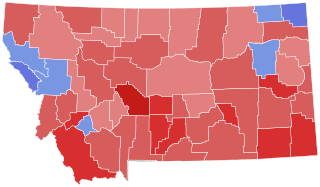
The 1920 Montana gubernatorial election took place on November 2, 1920. Incumbent Governor of Montana Sam V. Stewart, who was first elected Governor in 1912 and 1916, declined to run for re-election. To replace him, former United States Senator Joseph M. Dixon won the Republican primary, which was closely contested. In the general election, he faced Burton K. Wheeler, the former United States Attorney for the District of Montana and the Democratic nominee. Ultimately, Dixon defeated Wheeler by a wide margin to win his first and only term as governor.

